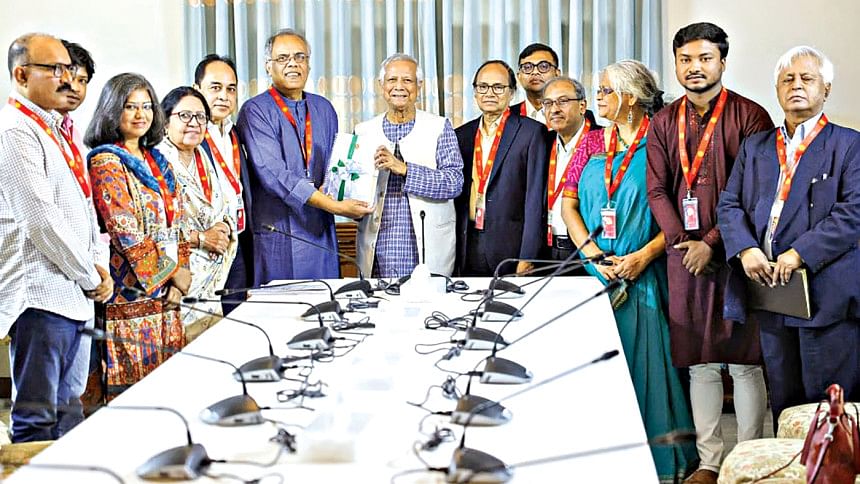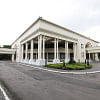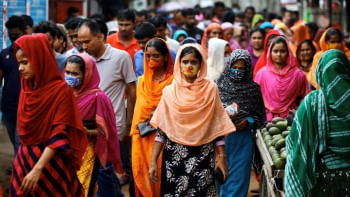Special law proposed to shield journos

The Media Reform Commission has proposed sweeping changes to ownership and supervision in the sector, along with measures to ensure journalists' safety and proper wages.
In its report submitted to Chief Adviser Prof Muhammad Yunus yesterday, the commission recommended a dedicated law to safeguard journalists.
It suggested the repeal of restrictive provisions in the anti-defamation law and the proposed Cyber Security Act, and amendments to the Official Secrets Act, which many argue hinder press freedom.
Additionally, the commission called for the establishment of an independent regulatory body to oversee the media. It suggested that defamation-related charges against journalists be handled by this body rather than through conventional legal channels.
It also recommended reforming the process of announcing newspaper circulation, increasing the rate of government advertisements for newspapers, and abolishing all types of advance taxes and 27.5 percent corporate tax on the newspaper industry.

"A review of audited accounts of various newspapers shows that even if a company makes a small pre-tax profit, it incurs a significant loss after paying taxes. If the high corporate tax rate and the practice of collecting advance taxes continue, many established newspapers will shut down within the next few years," the commission said.
Kamal Ahmed, chief of the commission, spoke to the media at a press conference after submitting the report to the chief adviser at his official residence Jamuna.
"We hope that the interim government and the future elected government will implement these recommendations," he said.
Prof Yunus said, "We want to swiftly implement the reform proposals that can be completed now. For that, I would like the reform commissions to promptly present the recommendations that can be quickly implemented."
Despite the presence of constitutional guarantees, institutions, and laws, media freedom in Bangladesh has not been ensured due to inadequate law enforcement and institutional inefficiency, according to the 12-member Media Reform Commission, which was formed on November 18 last year.
A significant portion of the media has become biased as a result of investments by political and business interests, leading to a decline in public trust and overall media credibility, according to the commission report.
The report emphasised that responsible media is indispensable for establishing democracy and a pluralistic society.
To improve media standards, the commission recommended strengthening the role of supervisory institutions and developing an internal accountability system within the media.
"Political will, from political parties and institutions, including the ruling government, is needed to uphold the constitutional and civil rights to freedom of expression and free access to information," the report said.
OWNERSHIP
Kamal said that the media did not reach its current state overnight. It is the result of long-term changes and practices that have severely impacted the independence of journalism.
"We have observed that a major issue in Bangladesh is the infiltration of black money into the media industry. Additionally, the problems in media ownership have become a significant challenge," he said.
Against this backdrop, the commission proposed that medium and large media companies issue shares to the public and be listed on the stock exchange.
It also said that founding directors, individuals, institutions, companies, or family members should not be able to have more than 25 percent of the shares. Employees should get 5 percent of the shares.
The commission recommended an ordinance to ban cross-platform ownership, where the owner of a television channel cannot own a newspaper, or vice versa.
It said such ownership is prohibited in the US. In the UK, a law prohibits the owner of a television channel from holding more than 20 percent of shares in a local newspaper. In India, a bill on this issue is awaiting parliamentary debate.
The commission recommended a "one house, one media" policy, where no single company, group, individual, family, or entrepreneur should own multiple media outlets.
"Measures must be taken to ensure transparency in media ownership so that people can make informed choices. Additionally, this will discourage the infiltration of black money into the media", said the report.
SEPARATE REGULATOR
The reform commission recommended the formation of an independent "Bangladesh Media Commission" replacing the Press Council and a Broadcasting Commission.This will bring all types of media under the supervision of a single institution, and ensure accountability and freedom of press.
The Bangladesh Media Commission, as a regulatory body, will determine the qualifications and disqualifications of publishers and editors to ensure that those convicted of criminal offences or loan defaulters cannot become owners/editors of media outlets.
This commission will set graduation as the minimum educational qualification for journalists, develop a code of conduct for them and ensure its implementation.
It will recommend licences for broadcasting media (TV and radio) and online portals, and ensure compliance with their terms.
The commission will provide redress for complaints from individuals, institutions, or groups harmed by false or motivated news.
PROTECT JOURNALISTS
Besides a separate law to ensure the safety of journalists, the reform commission recommended reviewing cases against journalists under the Penal Code, Information and Communication Technology Act, Digital Security Act, Cyber Security Act, and Contempt of Court Act.
Based on the review, appropriate steps must be taken for the submission of final reports by the police or the withdrawal of cases by the relevant government prosecutors, the commission said in its report.
All criminal defamation laws, like in sections 499, 500, 501, and 502 of the Penal Code, 1860, and section 29 of the Cyber Security Act, 2023, should be repealed, the report said.
It said the provisions of the proposed Cyber Security Ordinance that have raised concerns among journalists and rights activists, and section 5 of the Official Secrets Act, 1923, should be amended to emphasise national security and include legal protections for investigative journalism.
WAGES
The commission recommended that the minimum entry-level salary for journalists be aligned with that of Grade 9 officers in the Bangladesh Civil Service.
Since the cost of living in Dhaka is high, a "Dhaka allowance" may be added to the salaries of journalists staying in the capital, Kamal said.
Journalists outside Dhaka should be promoted to staff correspondent after working as a correspondent (retainer) for three years.
OTHER PROPOSALS
Currently, newspaper circulation is considered for enlistment on the government's media list.
The reform commission proposed that circulation be replaced by number of copies sold as the criterion for enlistment.
It said the advertisement rate for newspapers, which had not raised for a decade, should be increased now and then annually in line with inflation. Government and autonomous organisations should also promptly pay the dues owed to newspapers for published advertisements.
Customs duties on newsprint imports for the newspaper industry should be reconsidered, the report said.
The circulation numbers of English newspapers should not be compared with Bangla newspapers when determining government advertisement rates, according to the reform commission. Therefore, the maximum and minimum advertisement rates for
English newspapers need to be rationalised.
Arrangements should be made for easy-term, low-interest loans for the media, the commission added.
Additionally, it said a review of applications for private TV station licences shows that the process was not transparent or competitive. The issuance of these licences was primarily based on political considerations and, to some extent, business connections.
The government's policy has a provision that TV station licences will be issued for an initial period of five years and renewed after reviewing their proper operations. "In this context, all licences issued over the past decade and a half need to be reviewed," said the reform commission.
It also recommended having an acceptable and reasonable television rating point (TRP) system. Fees must be paid for the broadcast of government announcements and advertisements on television.
The government should direct cable operators to complete digitisation within one year so that television channels can generate revenue.
The decline in radio listeners and the dramatic drop in advertising revenue have put FM radio broadcasting in an existential crisis.
The security deposit kept by the government against radio station licences should be returned, and the provision for keeping a security deposit, along with the annual renewal system, should be abolished. Arrangements should be made to allocate government advertisements to FM radio as well.
The reform commission said the policy for online news portal registration should be updated and the registration should be done by the proposed media commission.
It said since the registrations granted to online portals over the past decade were not based on any transparent and specific policy, but through the arbitrary exercise of government power, they need to be reviewed.
The annual renewal system for online portals after registration should be abolished and government advertisements on online portals should be allocated based on specific policies, ensuring transparency and fairness.
Kamal said the reform commission proposed the establishment of an independent Jatiya Samprachar Sanghstha, merging state-run BTV, Bangladesh Betar, and Bangladesh Sangbad Sangstha.
BSS can play the role of the Jatiya Samprachar Sanghstha's news section, he said.

 For all latest news, follow The Daily Star's Google News channel.
For all latest news, follow The Daily Star's Google News channel. 






Comments